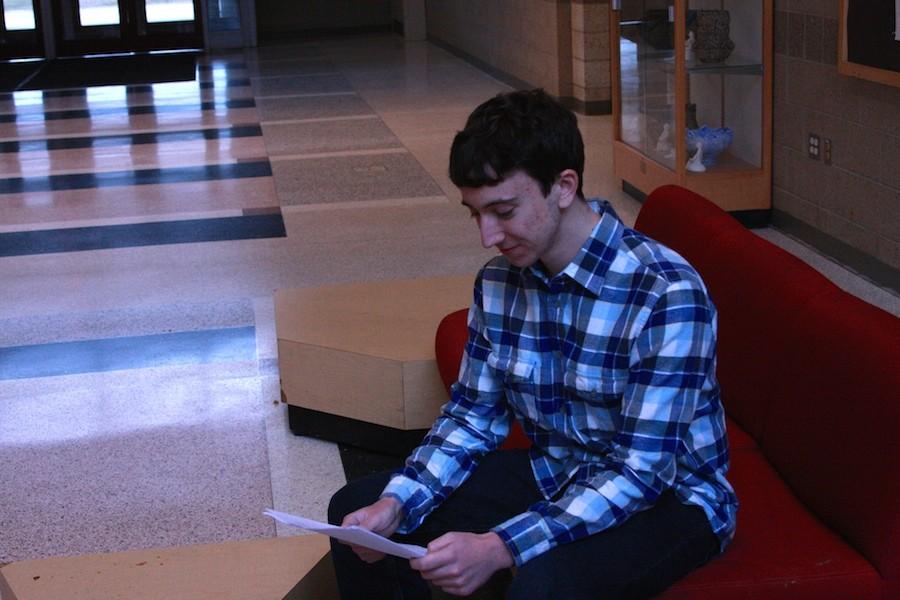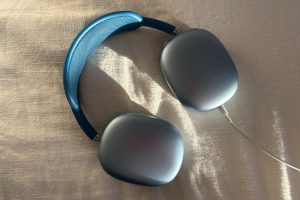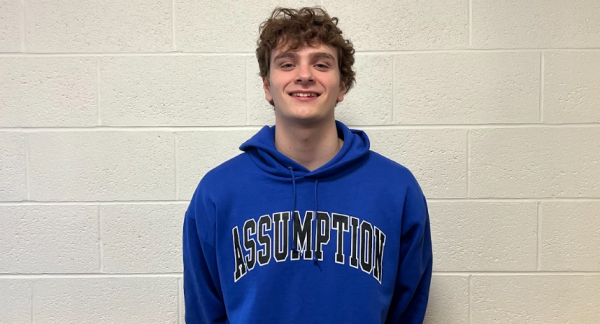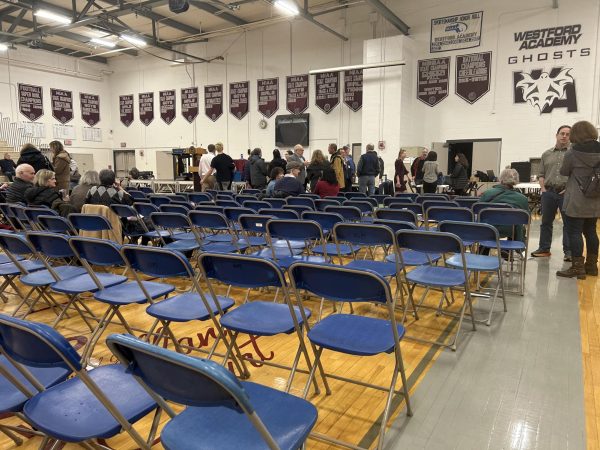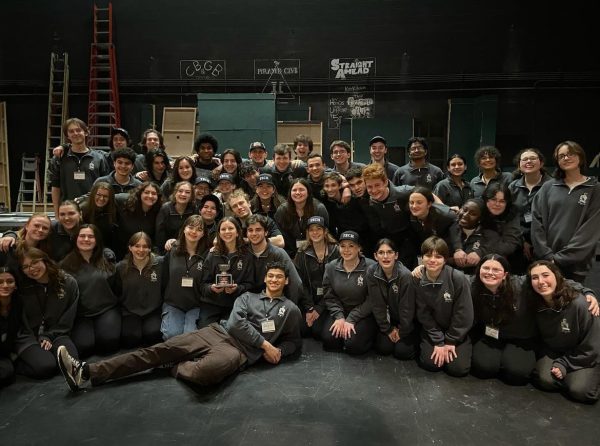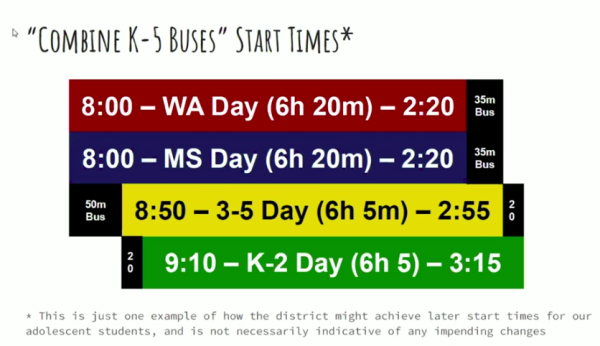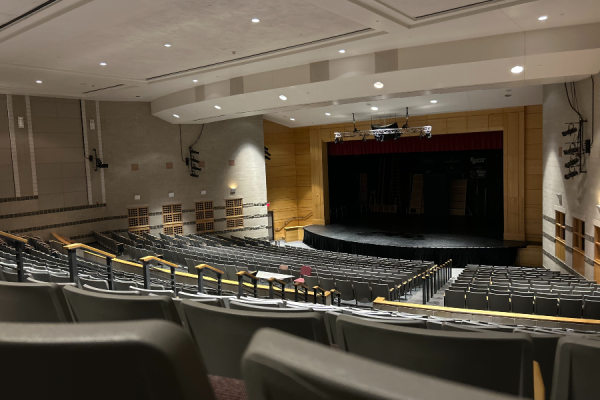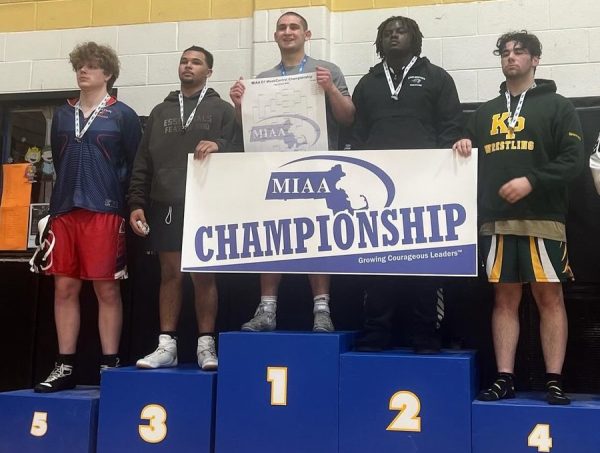One to World policy petitioned by student body
Senior Michael Colavita sitting down in the flag lobby, reviewing his petition.
March 20, 2016
On Friday, March 5th, senior Michael Colavita sent a petition signed by 533 Westford Academy students to members of the Westford Public School Committee protesting their recent unanimous vote to move the One to World program forward at WA. Unlike many student opposition statements which tend to die off, the anti-chromebook movement at WA was acknowledged by school faculty and district officials.
On Thursday, March 12th, Principal James Antonelli, Superintendent Everett Olsen, and other members of the Westford School Committee met with Colavita along with juniors Ryan Harm and Deborah Kreithen, and sophomore Harshal Sheth to discuss and negotiate further amendments to the One to World plan.
The One to World program, previously referred to as One to One, will provide the incoming Class of 2020 with Chromebook laptops that would last them all four years of high school. Along with this, WA plans to separate personal devices of students from the school wifi in order to make room on the network for 646 curriculum devices.
This decision has sparked controversy among the student body with many students upset by the fact they will have to rely on service plans in order to use their personal devices on campus. In an attempt to voice the opinions of the WA student community, senior Colavita wrote a petition summarizing common beliefs as to why the distribution of chromebooks at WA would be more harmful than beneficial overall.
Colavita summarized his opposition in two parts: first, he mentioned the selection of Chromebooks and later, he talked about the potential disturbances to the school’s wifi network.
He began by describing the general lack of utility in Chromebooks.
“We found that when we were looking at classes, and what technology classes use, chromebooks do not support the vast majority of things you’d have to do using the laptops currently. It’s essentially just a web browser; the computer can only run in-browser apps,” said Colavita.
Because of this, Colavita declared the chromebooks useless for the majority of curricular activity laptops are needed for at WA.
“There’s a lot of things you’d do using the laptops or the computer labs. Say you were in a programming class, you’d need to use the editing software, you’d need to use the compiler- not supported by chromebooks. If you were in an image editing class, and you had to use image editing [software]- not supported. If you were in a moviemaking class, a music class- not supported […] even though they would achieve the goal of getting chromebooks for every student, we’d really just be getting computers for every student for the sake of doing it. It wouldn’t have any tangible benefit for either students or classes,” he said.
Along with lack of utility in chromebook use, Colavita also expressed his dissatisfaction with One to World’s planned changes to the wifi network. In order to boost network speed, the school decided to knock students’ personal devices, such as cell phones or ipods, off of the wifi network, replacing them with the chromebooks.
“A lot of students are opposed to this because essentially, it’s going to be forcing students on to data plans. The case was made that you can put your own Chromebook on the wifi network; however, communications are not going to work, and only the incoming freshmen are getting Chromebooks. For the upper three classes, they’re gonna have nothing to connect to the wifi network anymore,” said Colavita.
Antonelli clarified that although he remains confident in the inclusion of Chromebooks in the budget, the wifi aspect might not be just.
“The biggest issue appeared to be the wifi, and that students would have to pay for their own wifi […] we talked about a potential fix for that, which would mean, potentially a separate server for students to use,” said Antonelli.
Regarding the Chromebooks themselves; however, he showed no intention of backing down.
“I’m a strong proponent of it […] it’s just the way you guys connect today, so it’s important for us to practice that now, because my job is to make sure you’re ready for the next steps,” he said.
“I just think that in light of how the student body has responded to everything, it’s probably a good idea to reconsider the policies. I think this school has a lot of other options in regard to wifi. I think if they reconsider their infrastructure, and maybe pay for more throughput for the wifi connection, they may get much better results than they would if they kick everyone off the wifi, and there’s a huge student backlash,” said Colavita.

